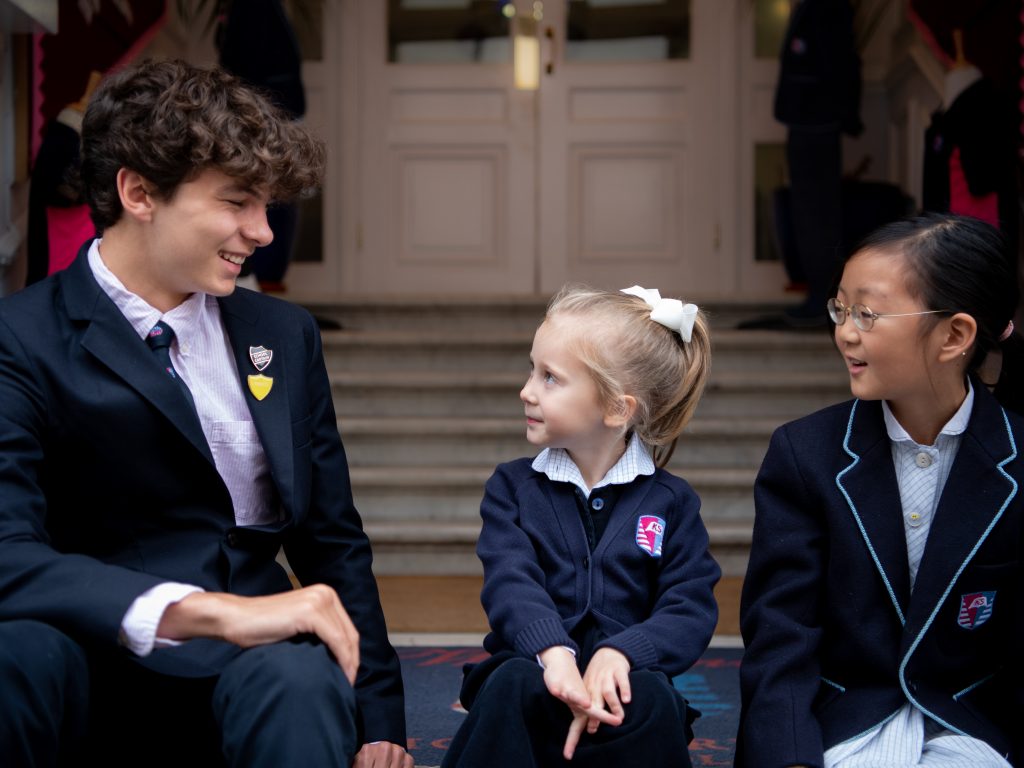Knightsbridge School’s pioneering partnership with Place2Be has helped its students build emotional resilience.
Knightsbridge School was the first private day school in the UK to develop a partnership with the children’s mental health charity Place2Be. Staff tell us about the impact it’s had for their pupils.
Magoo Giles, the Founder and Principal of Knightsbridge School, signed the school up with Place2Be in 2014. Magoo’s vision for the school included independent, specialist experts who could help students and teachers navigate an increasingly complex and changing world, which is where Place2Be came in.
Place2Be’s work in schools has become increasingly vital in recent years. The Covid pandemic, the war in Ukraine, and the subsequent economic crisis have been a huge challenge for many young people and their families. These factors have all contributed to a worrying spike in children presenting with poor mental health in UK schools.
The war in Ukraine in particular has felt very close to home at Knightsbridge School, which caters to students from a wide range of nationalities and backgrounds. “Knightsbridge School, like other non denominational organisations, can be a melting pot,” says Magoo.
“World events affect our children and families. Amongst our school population,, we have a wonderfully diverse and cultural group which includes Russians and Ukrainians. The last few months have been far from easy, but Place2Be has been crucial in creating understanding and giving children the language they need to communicate their emotions on this difficult subject”.
At Knightsbridge School, Place2Be’s one-to-one and group counselling, plus expert training for staff, has become an integral part of the school’s excellent pastoral support. Knightsbridge School is still one of only a few independent schools that work with Place2Be, but the school’s leaders are keen to spread the word about its impact and benefits.
“We are a progressive school and saw the increasing need to have a service that was impartial yet professional and supportive, in an ever-adapting landscape,” says Magoo.
“Creating a safe, confidential, impartial space for children to visit and work through their problems is critical for their development. We cannot expect to experience everything our young people go through, so it is crucial they have the support they need, and we can draw from the immense experience that Place2Be can offer.”
Place2Be quickly became an established part of the school system, embedded both inside
and outside the classroom. Making full use of Place2Be’s whole -school approach allowed the school to serve children who were at different stages of their emotional development, including those who were more reluctant to seek help.
Shona Colaço, Head of Knightsbridge School, says: “We have children here from completely differing backgrounds, cultures and experiences. Some are comfortable using specialist services, whereas, for others, the idea of seeking counselling is completely alien. Over the years, Place2Be has integrated seamlessly with our curriculum and existing pastoral care programme, allowing us to reach each child at the stage they most need it.”
And it’s not just the bigger world issues that children can struggle with. Academic pressure, performance anxiety, family dynamics, friendship and self-esteem issues can all affect children’s mental health. Place2Be School Project Manager Paula Losch says, “Many issues will resonate across both the independent and state sector, such as anxiety, which has been a big theme for us. A lot is demanded of children and having to respond to these demands can create pressure. Other issues are more specific to us as a school with such a diverse and international school community – we support children whose parents have recently relocated, who are learning English for the first time, who are forming friendships in new contexts.”
Many children were anxious about returning to school during Covid, or were worried about missing out, says Paula. They were concerned about how absence would affect their performance and their friendships. Would they miss something critical? Would everything be different when they got back? “Just knowing that Place2Be is there provided comfort and continuity,” she says.
She adds, “When children are overwhelmed by loneliness, sadness, grief or anxiety, they
can’t focus on learning and enjoying life with friends and family. The school recognises this
and that’s why Place2Be is such an essential service here. They know that for children to
grow academically, they must be well.”
Place2Be at Knightsbridge School runs drop-in sessions for pupils through their Place2Talk
service and provides guidance and a listening ear for parents to ensure there is a
wraparound approach to each child’s development.
“Though many people assume we are just providing one-to-one counselling sessions, it is so
much more. We lead in-class circle times, hold coffee mornings, and invite mental health
professionals to the school to speak on topics which are of most concern to students,”
explains Paula. “Students also know that they can knock on the Place2Be door at any time,
or leave a slip in a box, and we are here. We also offer a space for staff to come and discuss
issues and support parents, too – this includes partnering with the school’s parent groups
(specifically the Knowledge Society) . We are here for the whole school community.”
Since working with Place2Be, the school has spread the word within the independent sector
and helped broker critical relationships with other schools. Knightsbridge School has also
helped fundraise for Place2Be’s community outreach programmes.
So, what advice would Magoo give other schools interested in Place2Be?
“I would say go for it and go for it early. Early intervention is crucial”, he says. “ It helps to
create the right culture right from the start, which develops young people in all kinds of
ways. Place2Be has seriously opened the eyes of our young people to better mental health and helped to grow the empathy in our school community alongside our community values
The KS Code. We owe it to our children to care for their mental wellbeing as well as
academic progress.”

